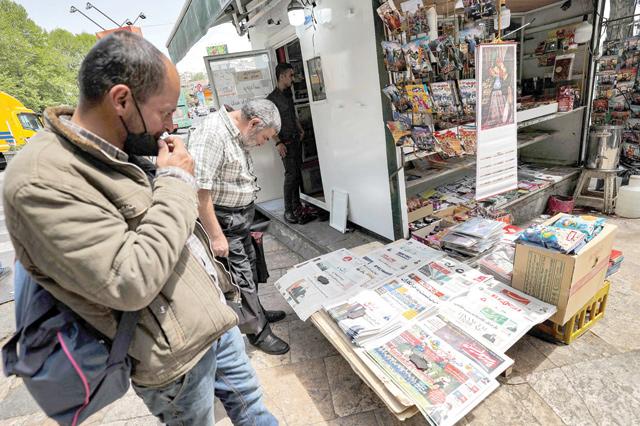You are here
CIA chief says criticism of Iran deal ‘disingenuous’
By AFP - Apr 08,2015 - Last updated at Apr 08,2015
WASHINGTON — CIA director John Brennan gave a staunch defence of the framework nuclear deal with Iran on Tuesday, calling some criticism of the accord "disingenuous" while expressing surprise at Tehran's concessions.
In his first public remarks since the outline agreement was announced last week, the spy agency chief said the deal would impose a litany of restrictions on Iran's nuclear work that had once seemed impossible to secure.
"I must tell you the individuals who say this deal provides a pathway for Iran to a bomb are being wholly disingenuous, in my view, if they know the facts, understand what's required for a [nuclear] programme," Brennan told an audience at Harvard University.
The outline deal announced last week would see the United States and the European Union lift all nuclear-related sanctions on Iran in exchange for a 98-per cent cut in Iran's stocks of highly enriched uranium for 15 years.
The accord would mean "cutting off pathways not just to uranium enrichment but to plutonium enrichment" and include a "very intrusive inspection regime", Brennan said.
"I certainly am pleasantly surprised that the Iranians have agreed to so much here.
“In terms of the inspections regime, the reduction as far as the centrifuges, the stockpile, what they’re doing with the Arak reactor — all of that I think is really quite surprising and quite good.”
Citing Tehran’s “concessions”, including agreeing to a dramatic reduction of centrifuges, Brennan said: “Boy, nobody ever thought they would do that at the beginning”.
Some critics were less focused on Iran’s nuclear programme and more on the effect of lifting sanctions, as they worry it will allow Tehran to “cause more trouble throughout the area”, Brennan said.
That was a legitimate concern, he said. But the framework deal itself offered a way of curtailing any attempt by Iran to build nuclear weapons and is “as solid as you can get”, he said.
US and allied intelligence agencies would be closely monitoring how Iran implemented any deal and there was no expectation that Tehran would alter its stance in the region, he said.
It was unclear if the pragmatic approach demonstrated by President Hassan Rouhani on the nuclear negotiations would “migrate to other areas of Iranian foreign policy”, he said.
“I think we’ll see. But I don’t think this is going to lead to a light switch when all of a sudden the Iranians are going to become passive, docile in the region, no.”
Brennan, a career intelligence officer who served as President Barack Obama’s counter-terrorism adviser before taking over at the spy agency, said Iran’s attitude on the issue had changed since Obama entered office six years ago mainly because sanctions had hit the country’s economy hard, he said.
New leadership under Rouhani, who was a “more reasonable” figure, also provided an opening. Apparently recognising the threat posed by the sanctions, the supreme leader, Ayatollah Ali Khamenei, gave a green light to Rouhani to try to broker a deal, Brennan said.
If the talks failed, Khamenei could then blame Rouhani and his foreign minister for the result, he added.
The CIA chief also suggested obliquely that digital sabotage on Iran’s uranium enrichment work had played a role.
Asked by New York Times reporter David Sanger if the cyber attack was a factor, Brennan said: “I think their inability to progress certainly helped slow that programme.”
Sanger in 2012 broke the story of Stuxnet, a US-Israeli effort to undermine Iran’s nuclear program with a damaging computer worm.
Brennan made a joking reference to Sanger’s articles, saying: “I wouldn’t attribute your reporting to helping that frankly.”
Related Articles
Iran's elite Revolutionary Guards said Sunday its forces shot down an Israeli drone as it approached an Iranian nuclear site, recovering major parts of what it described as an advanced aircraft. Israeli officials could not be immediately reached for comment.
TEHRAN — Iran said Monday it will surpass from June 27 its uranium stockpile limit set under the nuclear deal with world powers, turning up
TEHRAN — Iran's President Hassan Rouhani said on Wednesday the decision to boost uranium enrichment to 60 per cent was a response to arch-fo















